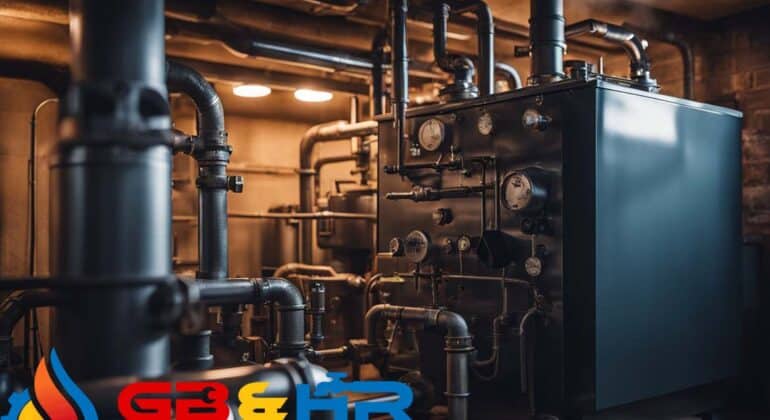Boiler condensate is not harmful to humans. It is a beneficial by-product of all modern, efficient boilers. Although essentially water, its slight acidity means it should not be drained into garden soil, nor should it be consumed in any way, even though it is harmless to touch it is not suitable for drinking.
What is Boiler Condensate? Understanding Its Safety and Environmental Impact
Boiler condensate, a byproduct of the combustion process in high-efficiency boilers, often raises questions about its safety and environmental impact. This liquid is produced when water vapour in the exhaust condenses as the boiler cools the gases. With many homes and businesses utilising condensing boilers for their energy efficiency, understanding the nature of boiler condensate is important. It is generally acidic, with a pH similar to that of black coffee or tomato juice, suggesting it is not immediately hazardous.
Managing your boiler’s condensate effectively is key to avoiding complications. If not properly handled or if leaks occur, condensate can cause property damage or environmental harm. It’s vital to keep condensate pipes in good condition and follow proper disposal guidelines to minimize any risks. While the acidity of condensate might sound concerning, understanding and managing it correctly can alleviate potential problems.
Key Takeaways
- Boiler condensate is acidic but not inherently harmful to humans
- Appropriate management of condensate is crucial to prevent property damage or environmental issues.
- Condensate from boilers isn’t like condensate from ACs, it has higher pH so it’s not good to use for gardening
- Regular maintenance of condensate pipes ensures safe disposal and reduces potential risks.
Routine checks and proper maintenance of condensate pipes are essential to prevent damage and environmental harm. It’s important to keep these systems in top condition. If you’re experiencing issues or need guidance on maintaining your boiler, visit our boiler service and boiler repair pages for professional assistance.
You may be interested in reading our article on the differences between condensing and non-condensing boilers for more information.
Composition of Boiler Condensate
The composition of boiler condensate is a key determinant of its impact on different materials and the environment. It primarily stems from the condensation of steam in high-efficiency boilers, revealing several chemical characteristics.
Chemical Properties
Boiler condensate contains various minor chemical constituents that result from the gas combustion process. It typically includes water, carbon dioxide, nitrogen oxides, and, in some cases, sulfuric or hydrochloric acids depending on the fuel’s sulfur and chlorine content.
Acidity and pH Levels
The acidity of boiler condensate is measured by its pH level, which commonly ranges from 3.5 to 5. This level of acidity is comparable to that of black coffee or tomato juice. It’s vital to stipulate that while this mild acidity is not generally harmful, it should be managed correctly to prevent corrosion in certain materials.
Impact on Materials
Boiler condensate can impact materials such as metals and concrete. It may lead to corrosion if not properly managed:
- Metals: Prolonged exposure can contribute to the corrosion of several metal types, especially those not designed for use with acidic substances.
- Concrete: While generally resilient, the continuous presence of condensate may result in deterioration over time, potentially necessitating protective measures or treatments.
Effects on Health and Environment
Boiler condensate is typically non-toxic, but its poor management or disposal can lead to environmental hazards and potential health risks.
Toxicity Considerations
Boiler condensate, a byproduct of the combustion process in boilers, is primarily water with low levels of waste materials. It is not poisonous to humans. However, if condensate leakages occur within a home, they could damage building materials and might lead to mould growth, which can affect respiratory health.
Ecological Impact
The ecological consequences of improperly disposed boiler condensate are noteworthy. Because the condensate is mildly acidic (with a pH level generally between 3 and 4), its release into the environment can result in the following:
- Soil Acidification: Lowers soil quality, potentially harming plant life.
- Water Contamination: Affects aquatic ecosystems and water sources.
Proper maintenance of condensate pipes ensures that these environmental impacts are mitigated. It’s crucial that disposal systems adhere to local regulations to prevent environmental contamination.
Handling and Disposal Recommendations
When dealing with boiler condensate, it’s essential to follow correct procedures to prevent potential environmental harm and property damage. This section details the necessary actions for safe disposal and neutralisation.
Safe Disposal Practices
Boiler condensate should be adequately routed to prevent any accidental leaks or accumulation. One should implement a disposal system that adheres to all local regulations, typically involving discharge into a waste or sewer system. Regular maintenance is crucial to ensure that condensate pipes are clear of obstructions and in good repair. Conducting routine checks can intercept issues before they lead to leaks or blockages.
Neutralisation Processes
The acidic nature of boiler condensate means that neutralisation might be necessary before disposal, especially when discharging to public sewer systems. Use of a neutralising agent, such as limestone chips or pH-neutralising pellets, can adjust the acidity levels. This treatment ensures that the water’s pH level is suitable for entering public systems without causing damage or environmental impact. Record keeping of neutralisation metrics is recommended to monitor the effectiveness and compliance with environmental standards.
Frequently Asked Questions
In this section, one will find concise answers to common queries regarding the characteristics and safety of boiler condensate in domestic heating systems.
Can human exposure to boiler condensate be harmful?
Boiler condensate is somewhat acidic with a pH similar to that of black coffee. Consequently, it poses negligible risk to human skin upon brief contact. Continuous exposure or ingestion, however, is not advisable.
What is the damage of boiler condensate?
Boiler condensate can cause significant damage if it leaks onto metal components connected to the boiler, such as gas pipes. This can lead to corrosion, resulting in gas leaks and potentially dangerous gas explosions.
Is boiler condensate water safe?
Boiler condensate water is not harmful to health as it is only mildly acidic. However, it can be corrosive to certain materials, including metals, so it should be handled with care.
What are the regulations surrounding boiler condensate pipes?
Boiler condensate pipes must have a minimum internal diameter of 30mm and be insulated with waterproof, UV-resistant material. They should terminate below the grid but above the water line, and include a suitable drain or leaf guard. To minimize the risk of freezing, the end of the pipe where it discharges into the grid should be cut at a 45-degree angle.
What risks does a leaking condensate pipe present?
A leaking condensate pipe can result in water damage to property structures or belongings. If left unaddressed, it also has the potential to contaminate local water sources.
How should one deal with a boiler condensate pipe leaking inside the property?
An immediate response to a leaking boiler condensate pipe involves containing the leak and contacting a certified heating engineer for boiler repairs. It’s essential that one addresses the situation quickly to prevent property damage.
What purpose does a boiler condensate trap serve?
The condensate trap in a boiler is designed to collect and release condensate safely into the waste system while preventing the escape of combustion gases, ensuring the system operates efficiently and safely.
Are condensing boiler fumes harmful?
Yes, condensing boiler fumes are harmful and should never be inhaled. Ensure that all waste gases and condensation from your boiler are properly vented outside through a wall or roof. It is also crucial to install a carbon monoxide alarm for safety.
Is condensate water hazardous?
Condensate water from combustion boilers is unsafe to drink as it contains toxic compounds. Similarly, while air conditioning condensate is not necessarily toxic like distilled or demineralized water, it is also unsafe for consumption.



